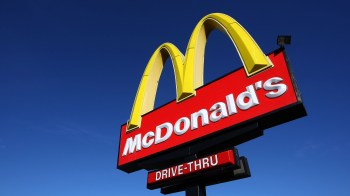When big companies act local
The “shop local” movement stretches back years, urging consumers to support their hometown businesses — everything from local produce at farmer’s markets to the small shops around the corner. But big stores want to feel more local too.
Take McDonald’s. In recent years, the fast-food chain has made a push to regionalize its menu by, for example, serving lobster rolls at some locations in the Northeast.
It used to be a prime example of a big chain that was completely the same no matter where it was located, said Denise Lee Yohn, a brand consultant and author of “What Great Brands Do.”
But in recent years, many national chains have started to loosen up.
“It’s so commonplace to have these national or international brands,” Yohn said. “It’s almost a negative when a company that’s large acts like a large company. People feel like they’re faceless, they don’t care about their customers, they’re more interested in making a profit as opposed to doing good things for the community.”
So whether it’s sourcing area products at Whole Foods, ingredients or decor at Shake Shack or using local yoga teachers for marketing at Lululemon, Yohn said big companies want to feel smaller for their customers.
This summer, Target began rolling out a line of city-specific products called Local Pride. It’s already in Boston, San Diego and Chicago with more cities to come.
In Boston, one of the most popular items is a T-shirt that reads “Wicked Smaht.”
Other shirts highlight local businesses, such as Legal Sea Foods and Tasty Burger.
Designer Todd Synder said he tried to make it feel like Target was ‘in the know’ in each city, “connecting with a customer and making them feel like, ‘Wow, I can’t believe Target has something like this,’ because I mean, Target’s huge. You kind of feel like, ‘Oh, I get it. They get me.'”
Target declined to discuss the additional cost of these local lines. Barbara Kahn, a professor at the University of Pennsylvania’s Wharton School, said each company will have to look at sales to see if they work with customers and if the extra costs are worth it.
“But I do think part of what retailers are looking for is to make shopping fun again,” she said. “I think people feel this ennui. It’s the same retail in Paris as it is in New York. It’s a little disappointing. It’s something about upping the shopping experience, creating curiosity.”
There’s a lot happening in the world. Through it all, Marketplace is here for you.
You rely on Marketplace to break down the world’s events and tell you how it affects you in a fact-based, approachable way. We rely on your financial support to keep making that possible.
Your donation today powers the independent journalism that you rely on. For just $5/month, you can help sustain Marketplace so we can keep reporting on the things that matter to you.

















